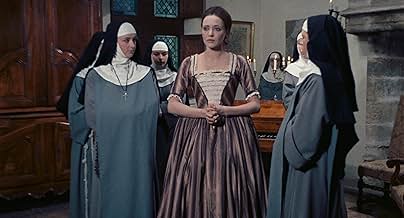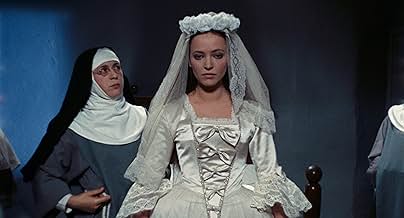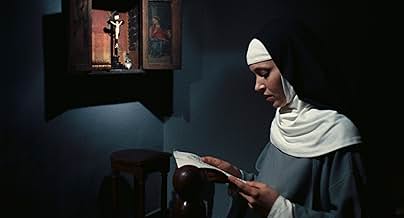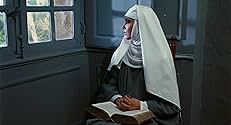IMDb RATING
7.5/10
3.5K
YOUR RATING
Suzanne is forced against her will to take vows as a nun and three mothers superior treat her in radically different ways. Suzanne's virtue brings disaster to everyone.Suzanne is forced against her will to take vows as a nun and three mothers superior treat her in radically different ways. Suzanne's virtue brings disaster to everyone.Suzanne is forced against her will to take vows as a nun and three mothers superior treat her in radically different ways. Suzanne's virtue brings disaster to everyone.
- Director
- Writers
- Stars
- Awards
- 2 nominations total
- Director
- Writers
- All cast & crew
- Production, box office & more at IMDbPro
Featured reviews
'La Religieuse' was published twelve years after the death of its author Denis Diderot, one of the greatest representatives of the Age of Enlightenment and the most unjustly reviled during his lifetime.
The novel, supposedly inspired by the death of his sister in a convent, was unsurprisingly disdained by Catholics. When it was presented on the stage by Jean-Luc Godard with his then wife Anna Karina in the title role it caused not a ripple but when it came to the film version however, there were calls for it to be banned. There is no such thing of course as bad publicity and when it was released in 1967 the attendant controversy proved to be very good box office!
This is not an easy watch to put it mildly. Director Jacques Rivette makes no concessions to the viewer. There are few close ups, no score to speak of and the tempo is lento throughout its 135 minute length.
What it does have is four strong female roles played by four exceptional actresses. Anna Karina reprises her stage role of Suzanne and one can tell that she has lived with the part and made it her own. It is a stunning performance. Micheline Presle, in one of the best of her later roles, is the Mother Superior who takes Suzanne under her wing but whose death leaves her to the not so tender mercies of Sister Sainte-Christine whose excess of pious zeal is frightening. Francine Bergé's impersonation of a nun in 'Judex' might have caused a few tingles in the male of the species but her performance here gives one the shivers.
Once Suzanne has been moved to another 'maison' she then falls prey to the Sapphic advances of the Mother Superior played by Liselotte Pulver. This is another splendid performance by the luminous Liselotte and will come as quite a surprise to English speaking viewers who remember her dancing in a polka dot dress on a table top to the strains of the 'Sabre Dance' in Wilder's 'One, Two, Three'!
Of the male contingent, Jean Martin and Francisco Rabal both impress.
This is a tale of Repression and is shot in an austere, Bresson-esque style which suits the material very well. The trailer proclaimed it to be a 'Hymn to Freedom' which would have gladdened Diderot who famously wrote: "No man will be free until the last king is strangled with the entrails of the last priest."
The novel, supposedly inspired by the death of his sister in a convent, was unsurprisingly disdained by Catholics. When it was presented on the stage by Jean-Luc Godard with his then wife Anna Karina in the title role it caused not a ripple but when it came to the film version however, there were calls for it to be banned. There is no such thing of course as bad publicity and when it was released in 1967 the attendant controversy proved to be very good box office!
This is not an easy watch to put it mildly. Director Jacques Rivette makes no concessions to the viewer. There are few close ups, no score to speak of and the tempo is lento throughout its 135 minute length.
What it does have is four strong female roles played by four exceptional actresses. Anna Karina reprises her stage role of Suzanne and one can tell that she has lived with the part and made it her own. It is a stunning performance. Micheline Presle, in one of the best of her later roles, is the Mother Superior who takes Suzanne under her wing but whose death leaves her to the not so tender mercies of Sister Sainte-Christine whose excess of pious zeal is frightening. Francine Bergé's impersonation of a nun in 'Judex' might have caused a few tingles in the male of the species but her performance here gives one the shivers.
Once Suzanne has been moved to another 'maison' she then falls prey to the Sapphic advances of the Mother Superior played by Liselotte Pulver. This is another splendid performance by the luminous Liselotte and will come as quite a surprise to English speaking viewers who remember her dancing in a polka dot dress on a table top to the strains of the 'Sabre Dance' in Wilder's 'One, Two, Three'!
Of the male contingent, Jean Martin and Francisco Rabal both impress.
This is a tale of Repression and is shot in an austere, Bresson-esque style which suits the material very well. The trailer proclaimed it to be a 'Hymn to Freedom' which would have gladdened Diderot who famously wrote: "No man will be free until the last king is strangled with the entrails of the last priest."
one of films who reflects inspired vision about Diderot's novel and high performances. one of the most impressive roles for Ana Karina and touching science for explore the detail for Liselotte Pulver. a film as puzzle of delicate nuances. subtle, cruel, delicate, precise, touching. and surprising for the atmosphere and for the image. reflecting the spirit of a period, it becomes a gem. for the grace and for the cruelty. for the vulnerability of each character and for the force of the lead character. for the beauty of image. and for the art of Jacques Rivette to use a theme in the most convincing manner. a film about freedom. and the fight for it.
This is exactly the kind of thing I would watch on Encore movie channel as a 13 year old in the 90s and think because it was a highly specific film hidden in the dark hour of 2 AM that it must be underground or convey secret things about life.
And I guess it does if these are secret, irrelevant, forgotten things, like the dream of a previous era that one can never know to be true or false.
But for sure, the films I saw like this I won't forget. They are like whole history lessons delivered in double--the time period of the story, and the culture period of the production.
The acting, and the beautiful set pieces and locations, and the nonmusical, drony bell music add to this impression of jarringly subtle value, meanwhile the story has that quality of classic French novels which I can somehow feel emanating from old Penguin paperbacks... the height of drama in an atmosphere of emptiness, the pathetic outnumbered by the purely unsympathetic, scene after scene; and all of it mired in seriousness and God.
Drink a few beers and go for it!
And I guess it does if these are secret, irrelevant, forgotten things, like the dream of a previous era that one can never know to be true or false.
But for sure, the films I saw like this I won't forget. They are like whole history lessons delivered in double--the time period of the story, and the culture period of the production.
The acting, and the beautiful set pieces and locations, and the nonmusical, drony bell music add to this impression of jarringly subtle value, meanwhile the story has that quality of classic French novels which I can somehow feel emanating from old Penguin paperbacks... the height of drama in an atmosphere of emptiness, the pathetic outnumbered by the purely unsympathetic, scene after scene; and all of it mired in seriousness and God.
Drink a few beers and go for it!
"The crux is, for Susanne, devout as she is, she feels that she has never received the calling from God. Her eventual vow-taking ceremony is conspicuously omitted on the screen, and reckoning by the reactions of her mother (Lénier) and Mother Superior Mme de Moni (Presle, ever so graceful and compassionate), something is certainly amiss there. Later Susanne claims that she has no recollection of the ceremony, perhaps she was in a fugue, witnessed by many, that fact could have been graciously taken as a testimony of revoking her vows had the church assumed a more liberal attitude towards its devotees. So one can see that it is religious orthodoxy, not Catholic church itself is the fair game here."
read my full review on my blog: cinema omnivore, thanks
read my full review on my blog: cinema omnivore, thanks
As the ruthless Diana Monti in Georges Franju's 'Judex' (1963), Francine Berge (soon to be seen in Philippe Garrel's forthcoming 'La Lune Cravee') had attempted to abduct virginal young heroine Jacqueline Favreaux (played by Edith Scob) while disguised as a nun. Three years later it's now Anna Karina she has in her clutches as the cruel Sister Sainte-Christine.
As it reels from one abuse scandal to the next the last thing the Catholic Church needs right now is the timely revival of this harrowing reminder of the sheer relentless boredom and awfulness of convent life over two centuries earlier into which young women were often cast for financial rather than spiritual reasons. Especially as we now know the church was still pursuing it's abuse of the vulnerable even as it waged a furious campaign to suppress this film on it's initial appearance back in the sixties.
An incongruously sumptuous-looking production in widescreen & colour from one of the most austere directors of the Nouvelle Vague, the film is of course vastly enhanced by the melancholy beauty of Anna Karina in the title role and by the ever delightful Lilo Pulver as the sapphist Mother Superior of a rollicking and worldly convent that closely resembles Castle Anthrax in 'Monty Python and the Holy Grail'.
As it reels from one abuse scandal to the next the last thing the Catholic Church needs right now is the timely revival of this harrowing reminder of the sheer relentless boredom and awfulness of convent life over two centuries earlier into which young women were often cast for financial rather than spiritual reasons. Especially as we now know the church was still pursuing it's abuse of the vulnerable even as it waged a furious campaign to suppress this film on it's initial appearance back in the sixties.
An incongruously sumptuous-looking production in widescreen & colour from one of the most austere directors of the Nouvelle Vague, the film is of course vastly enhanced by the melancholy beauty of Anna Karina in the title role and by the ever delightful Lilo Pulver as the sapphist Mother Superior of a rollicking and worldly convent that closely resembles Castle Anthrax in 'Monty Python and the Holy Grail'.
Did you know
- TriviaDespite being approved by the Censorship Board the film's theatrical release was initial blocked by the Minister of Information.
- GoofsSuzanne plays and sings the song "Plaisir D'Amour". The final title card identifies the time and place as 'Paris, 1760', but the song was not composed until 1785.
- Quotes
Monsieur Hébert: Your superior will shortly be told in the name of Sister Marie-Suzanne Simonin of a protest against her vows with a request to leave religious life and leave the cloister to live her life as she sees fit.
- ConnectionsFeatured in Deux de la Vague (2010)
- How long is The Nun?Powered by Alexa
Details
- Release date
- Country of origin
- Official sites
- Languages
- Also known as
- Redovnica
- Filming locations
- Production companies
- See more company credits at IMDbPro
Box office
- Gross US & Canada
- $30,245
- Opening weekend US & Canada
- $6,273
- Jan 6, 2019
- Gross worldwide
- $32,659
- Runtime
- 2h 14m(134 min)
- Sound mix
- Aspect ratio
- 1.85 : 1
Contribute to this page
Suggest an edit or add missing content

![Watch Bande-annonce [OV]](https://m.media-amazon.com/images/M/MV5BZjIxOTRkY2ItNjJkOS00ZWMwLWFkM2UtY2FmYzU4NTIyNWQ2XkEyXkFqcGdeQXRodW1ibmFpbC1pbml0aWFsaXplcg@@._V1_QL75_UX500_CR0)






























